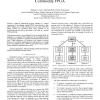1240 search results - page 125 / 248 » Trusted Design in FPGAs |
VLSID
2007
IEEE
15 years 10 months ago
2007
IEEE
In the past, Field Programmable Gate Array (FPGA) circuits only contained a limited amount of logic and operated at a low frequency. Few applications running on FPGAs consumed exc...
89
Voted
RSP
1999
IEEE
15 years 2 months ago
1999
IEEE
Over the past decade, the steady growth rate of FPGA device capacities has enabled the development of multi-FPGA prototyping environments capable of implementing millions of logic...
66
Voted
DIGRA
2005
Springer
15 years 3 months ago
2005
Springer
Challenge and conflict are elements that all game designers strive to engineer into their games. Research shows that challenge is what drives a high proportion of games players ye...
81
Voted
ASIACRYPT
2000
Springer
15 years 2 months ago
2000
Springer
The mobile agent is a fundamental building block of the mobile computing paradigm. In mobile agent security, oblivious transfer (OT) from a trusted party can be used to protect th...
105
click to vote
SIES
2009
IEEE
15 years 4 months ago
2009
IEEE
— Software intellectual property (SWIP) is a critical component of increasingly complex FPGA based system on chip (SOC) designs. As a result, developers want to ensure that their...

